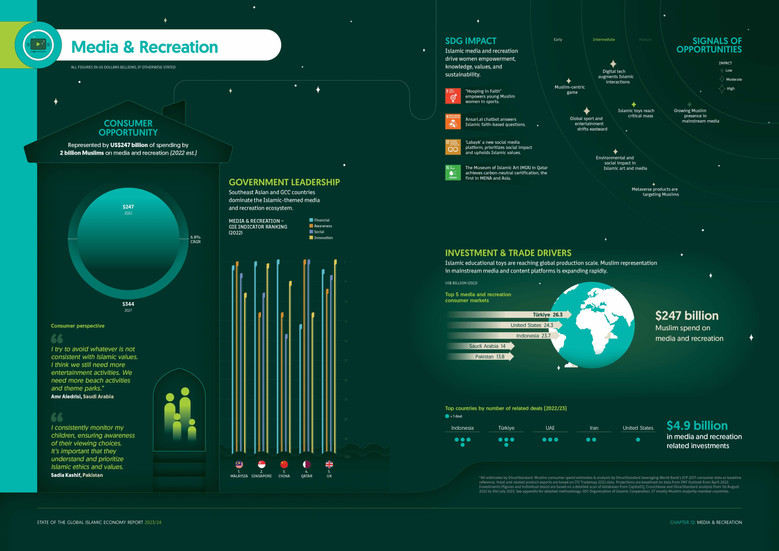- Iman Ali Liaqat
- Dec 26, 2023
- 3 min read
Consumer spending in global Islamic Economy sectors grew 9.5% YOY to US$2.29 trillion in 2022
Malaysia retained the top spot in the Global Islamic Economy Indicator (GIEI) for the 10th consecutive year, followed by Saudi Arabia, Indonesia and the UAE. Indonesia moved up the ranking to #3.
Investments in Islamic economy-relevant companies totalled US$25.9 billion in 2022/23, an increase of 128 per cent from the previous year
Global Muslim spending on food and beverages is forecast to hit US$1.89 trillion by 2027
Islamic finance assets expected to reach US$5.96 trillion by 2026
33 key signals of opportunities were identified, including novel halal certification, Islamic DeFi and Blockchain, leisure and spiritual retreats, AI-driven tourism, social media-led commerce, changed clothing demands, vaccine and biopharmaceutical growth, green pharma innovation, and live commerce

The Department of Economy and Tourism (DET) has announced the results of the State of the Global Islamic Economy Report (SGIE) 2023/24. Launched in 2013, the tenth edition of the report presents an annual update on the Islamic Economy - encompassing halal products, Islamic finance, and lifestyle sectors and services.
This year’s SGIE report, produced by DinarStandard, a US-based research and advisory firm, indicates that Muslims spent US$2.29 trillion in 2022 on food, pharmaceuticals, cosmetics, modest fashion, travel, and media. Islamic finance assets are estimated to have reached US$3.96 trillion in 2021 and will grow to 5.96 trillion by 2026.
The report’s national benchmarking Global Islamic Economy Indicator (GIEI) of 81 countries ranked Malaysia #1 which retained the top spot for the 10th consecutive year. Malaysia was followed by Saudi Arabia, Indonesia and the UAE. Indonesia moved up the ranking to #3. Bahrain has returned to the top 5 for the first time since 2019/20 and South Africa has entered the top 15 countries for the first time. The biggest gains within the top 15 were achieved by Iran, Qatar, Pakistan, and South Africa.
Investments in Islamic economy-relevant companies increased significantly, reaching $25.9 billion in 2022/3, representing a 128% year-on-year growth. Over 55 per cent of investments were within the Islamic finance category, while Media attracted 19.2 per cent, Travel 13.1 per cent and Halal Food 8.5 per cent. Such figures reflect corporate-led mergers and acquisitions, venture capital investments in tech start-ups, and private equity investments.
Import of halal-related products by the OIC member countries is set to grow at 7.6% CAGR to US$492 billion in 2027, with US$359 billion in 2022. Imports by OIC member countries represent a significant majority of halal products traded globally, which include food and beverage, fashion (apparel and footwear), pharmaceuticals, and cosmetics.
Rafi-uddin Shikoh, CEO and Managing Director of DinarStandard said: “The SGIE report, in its 10th year, with the grace of God Almighty, has evolved into a global reference point to evaluate the Islamic Economy’s annual developments globally across the seven sectors covered while highlighting potential areas of development. Over the past decade, the Report has reached over 101,000 readers across 85 countries, with over 14,150 report downloads and over 1,570 media mentions. Muslim spending has increased from SU$1.62 trillion in 2012 to US$2.29 trillion a decade later.”
The SGIE report also highlights Islamic economies’ social impact developments in addressing the United Nations’ 17 Sustainable Development Goals (SDGs), including initiatives addressing the exacerbated poverty and food security crisis, which the Islamic economy is showing promising signs of impact.
The SGIE report 2023/24 has been produced in partnership with SalaamGateway.com, the largest Islamic economy news and media platform. The Global strategic partner of the report this year is halal certifier IFANCA.















